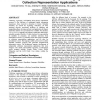Free Online Productivity Tools
i2Speak
i2Symbol
i2OCR
iTex2Img
iWeb2Print
iWeb2Shot
i2Type
iPdf2Split
iPdf2Merge
i2Bopomofo
i2Arabic
i2Style
i2Image
i2PDF
iLatex2Rtf
Sci2ools
111
click to vote
CIKM
2010
Springer
2010
Springer
Meta-metadata: a metadata semantics language for collection representation applications
Collecting, organizing, and thinking about diverse information resources is the keystone of meaningful digital information experiences, from research to education to leisure. Metadata semantics are crucial for organizing collections, yet their structural diversity exacerbates problems of obtaining and manipulating them, strewing end users and application developers amidst the shadows of a proverbial tower of Babel. We introduce meta-metadata, a language and software architecture addressing a metadata semantics lifecycle: (1) data structures for representation of metadata in programs; (2) metadata extraction from information resources; (3) semantic actions that connect metadata to collection representation applications; and (4) rules for presentation to users. The language enables power users to author metadata semantics wrappers that generalize template-based information sources. The architecture supports development of independent collection representation applications that reuse wra...
Related Content
| Added | 24 Jan 2011 |
| Updated | 24 Jan 2011 |
| Type | Journal |
| Year | 2010 |
| Where | CIKM |
| Authors | Andruid Kerne, Yin Qu, Andrew M. Webb, Sashikanth Damaraju, Nic Lupfer, Abhinav Mathur |
Comments (0)

